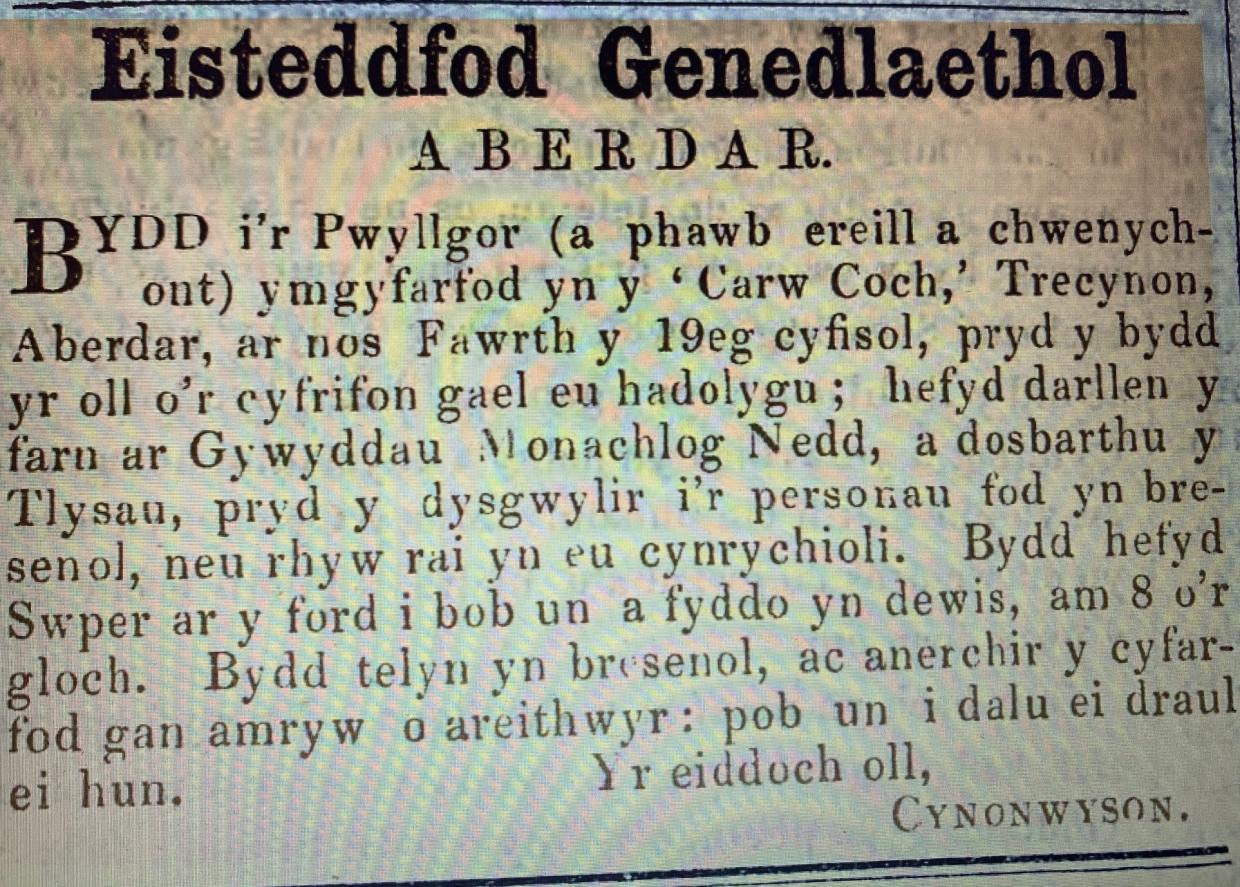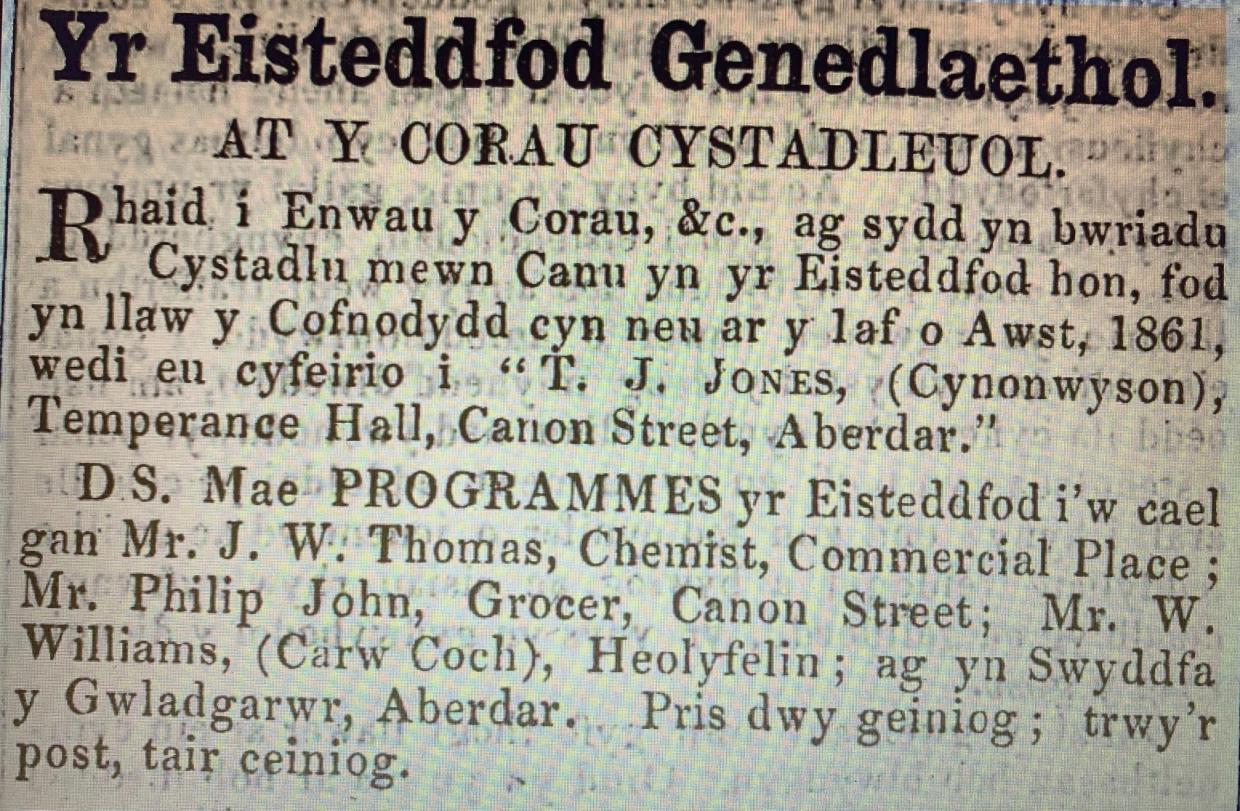It was decided to create an organisation called 'The Eisteddfod' with an executive committee known as 'The Council'. It was also decided that the Eisteddfod would visit North and South Wales alternately, to give everyone the opportunity to visit the Eisteddfod when they came to their local area.
Aberdare was chosen as the first location for the National Eisteddfod, and in July 1861, a poem by 'Nai'r ‘Rhen Ddyrnwr 'was published in Y Gwladgarwr, to welcome everyone to the Eisteddfod in Aberdare, a month later. We must hope that the standard of compositions received for the Eisteddfod itself were of a better standard than this particular poem!
‘Rwyf heddyw yn gwahodd yn nghyd
Y beirdd o bedwar cwr y byd,
I ddyfod, cofiwch oll mewn pryd,
I’r National’ Eisteddfod.
Am dri diwrnod ar y Ton,
O fewn mis Awst cynhelir hon,
Bydd Tent eangfawr newydd spon
I’r ‘National’ Eisteddfod.
Dysgwyliwn weled Emrys gawr,
A’r hyglod Fardd o Glynog fawr,
A Robyn Wyn yn d’od i lawr,
I’r ‘National’ Eisteddfod.
Talhaiarn hefydd ddaw i’r De’
A bechgyn doniol Llundain dre’,
A’r Captain Gwrgant deued e,
I’r ‘National’ Eisteddfod.
Daw RJ Derfel gyda’r llu,
A’r enwog Llystyn coeliwch fi,
Ac Awdwr ‘Oriau’r Hwyr’ am spri,
I’r ‘National’ Eisteddfod.
Nicander Cymru ddaw pryd hyn,
A Iorwerth hyfwyn bardd y glyn,
Glasynys hoff ac Ellis Wyn
I’r ‘National’ Eisteddfod.
Fe ddaw Creuddynfab yn ei chwys,
A’r ieithydd clodwiw RJ Prys,
Glan Alun hefyd, gyda brys,
I’r ‘National’ Eisteddfod.
Bydd Llawdden gynt o Gastellnedd,
A’r Llew o Fôn yn llon ei wedd,
Yn d’od i lawr ar awr y wledd,
I’r ‘National’ Eisteddfod.
Daw Ioan Emlyn galon rydd,
A Dewi Wyn o ger Caerdydd,
A’r bardd Cynddelw rhed fel hydd,
I’r ‘National’ Eisteddfod.
Daw Brinley Richards beth dal son,
A phob rhyw gerddor peraidd dôn,
A’r beirdd o Aberdar i Fôn,
I’r ‘National’ Eisteddfod.
Bydd yma ddynion gwyllt a gwâr,
A Chor Undebol Aberdar,
A llawer llanc yn gyrru’n scwar,
I’r ‘National’ Eistedddfod.
Ni fynwn gael excursion Tren,
Er cludo’r ieuanc fel yr hen,
Pob un i ddyfod gyda gwen,
I’r ‘National’ Eisteddfod.
Everyone was looking forward to the National Eisteddfod in Aberdare. Officials had been meeting in different parts of England and Wales throughout the year - indeed, one meeting in Shrewsbury lasted nearly ten hours – to choose competitions and to discuss the arrangements the for the first national festival.
The adjudicators for the poetry competitioons had been chosen at a public meeting at the Temperance Hall in Aberdare at the end of the previous year, chaired by Alaw Goch, and Eben Fardd, Aneurin Fardd and Emrys looking forward to their work, although there had been some complaints among the poets when Emrys was selected as one of the festival's leading judges.
So everything was in place for the opening of the Aberdare National Eisteddfod in the town and the area had been decorated to welcome everyone to the festival, according to the Cardiff and Merthyr Guardian on 24 August, 1861, “The streets of Aberdare presented quite an animated appearance, the streets were decorated with floral devices, and triumphal arches, while the windows of the house floated and profusion of bunting, embracing flags of all nations.”
However, the great Aberdare festival was not without its problems, although it would be hard to believe this reading the opening of the Seren Cymru report on 31 August 1861, "The National Eisteddfod has held its first series of meetings in Aberdare. We had looked forward to the event with great concern, and we are now able to look back at the proceedings with complete satisfaction. It is fair to say that the great Eisteddfod has been a GREAT SUCCESS.”
Although the readers of the Cardiff and Merthyr Guardian might not agree with the above description of the festival - this report certainly does not describe an event that was a GREAT SUCCESS, as Seren Cymru had declared. The report said, "The Eisteddfod was proclaimed to be opened on Tuesday morning, not altogether under the most favorable circumstances, in fact the elements were completely against the affair. The committee, at the head of which D Williams, Esq., Of Ynyscynon House, Aberdare, had at the great expense of £ 300 (now £ 35,944) contracted with a builder, at Gloucester, to erect a monstre wooden marquee on Hirwain Wrgant Common. After its erection the rain fell and the winds blew so strong as to unroof it. In the result of the "international assembly had to take place somewhere else, and in this dilemma the committee obtained the Market-house, which is a capacious building."
So, it’s clear that bad weather is not a new problem for the National Eisteddfod - the dangers have been around for almost 160 years!
At the end of September, Alaw Goch, Chair of the Eisteddfod Council wrote a letter to Y Gwladgarwr evaluating the Eisteddfod in Aberdare. It is clear that the high winds at the start of the week had an effect on the festival, as there was a financial loss as people stayed away after hearing about the problems leading to the "destruction of our grand tent".
But the letter was also an opportunity to celebrate the week's successes, noting, "Yet everyone, poor and noble, small and large, old and young, far and near, like the children of Evan Dafydd, came together, enjoying each other, with a happy smile on every face – there wer no reports of as many as one crime committed by anyone - no drunken man to be seen on the road – everyone was swallowed up by the spirit of the Eisteddfod, and looking forward to the next festival in Caernarfon. ”
So at the end of the first National Eisteddfod in Aberdare, the organisation was looking forward to travelling up north to visit Caernarfon Castle. And so started the year-on-year pattern of north-south festivals, which has continued to this day, over a hundred and fifty years later.


